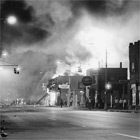Dawn broke on April 16, 2007, as it does always, but this day would soon reveal itself to be unlike any other. For this was the day that a twenty-three-year-old student walked onto the campus at Virginia Tech carrying two …
Over the last century, the link between sex and reproduction has weakened. Feminist activism, aided by technological advances, has given middle-class women in the United States widespread access to effective contraception and safe, legal abortion. Although far too many exceptions …
Botched presidencies open the way to change, sometimes for better (let’s hope now), sometimes for worse. Think of Jimmy Carter’s tenure, which left us in “malaise,” Ronald Reagan in Washington, and Ayatollah Khomeini in Tehran. Carter’s agenda for federalism and …
Americans are not well served by their current medical care arrangements. Compared to our major trading partners and competitors, we are less likely to be insured for the cost of care, and the care that we receive is almost certain …
Who named the neoconservatives? You are looking at the perpetrator, or so it is believed. Dissent and its circle, in the early 1970s, invented the term to denigrate the right-moving intellectuals who wrote in Commentary and the Public Interest. The …
On May 30, Britain’s 120,000-strong University and College Union voted to endorse a call to boycott Israeli universities.” Martha Nussbaum in a forthcoming Summer 2007 article (now featured online) argues against all forms of the academic boycott.
The Enemy At Home: The Cultural Left and Its Responsibility for 9/11 by Dinesh D’Souza
New Orleans, June 2006. Photo: Paul Baker When Hurricane Katrina (or, more accurately, the failure of the levees) washed away the New Orleans Public Schools (NOPS) at the end of August 2005, there was relief in many quarters. Within days …
In her excellent, tightly reasoned “Against Academic Boycotts” (Summer 2007), Martha Nussbaum notes that the “main force of the boycott” is directed against “individual members of the [Israeli] institutions,” who are accused of not condemning their “government as much as …
From Civil Rights to Human Rights: Martin Luther King Jr., and the Struggle for Economic Justice by Thomas F. Jackson

The question is puzzling because many of the conditions thought to have precipitated the eruption of civil violence in the 1960s either persist or have grown worse.
In his essay “‘Progressive’ Jewish Thought and the New Anti-Semitism” (first released by the American Jewish Committee in 2006 and reported to a wide readership in the New York Times in 2007), Alvin H. Rosenfeld takes to task liberal Jewish …
If you aspire to write, calling yourself a writer doesn’t make it so. You must first have written a book, compiled a few decent magazine clips, or have a mildly snarky and occasionally read blog to make the leap into …
Zimbabwe was known as the “jewel of Africa,” as Samora Machel, the Marxist president of Mozambique, told Robert Mugabe when the new nation won its independence in 1980. As the second-most-industrialized country on the continent, the former Southern Rhodesia already …
Books discussed: The End of Southern Exceptionalism: Class, Race, and Partisan Change in the Postwar South, by Byron E. Shafer and Richard Johnston; Divided America: The Ferocious Power Struggle in American Politics by Earl Black and Merle Black; Whistling Past Dixie: How Democrats Can Win Without the South by Thomas F. Schaller; The Silent Majority: Suburban Politics in the Sunbelt South by Matthew D. Lassiter; White Flite: Atlanta and the Making of Modern Conservatism by Kevin Kruse.







